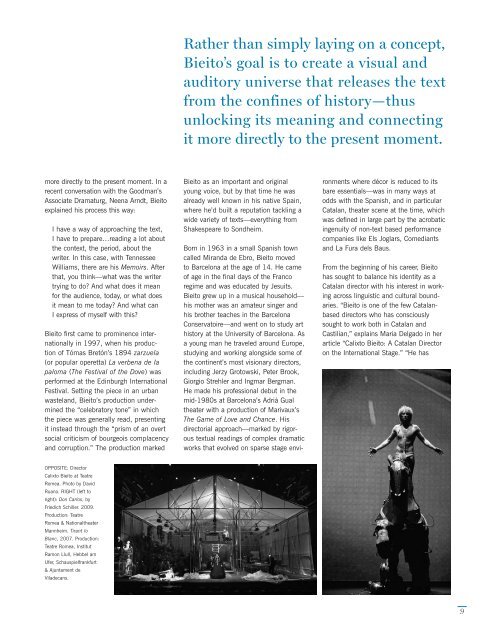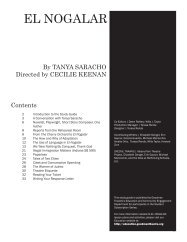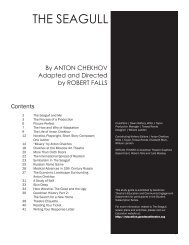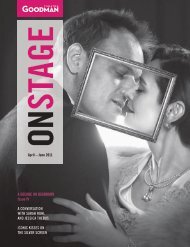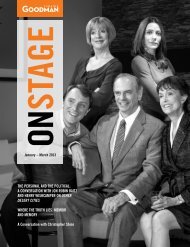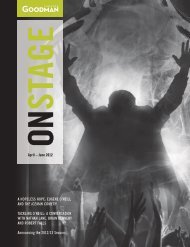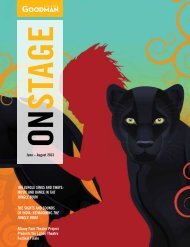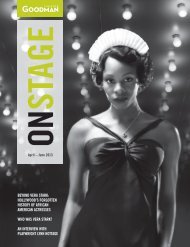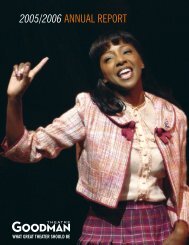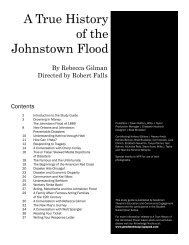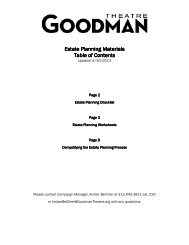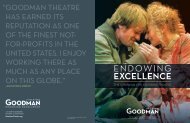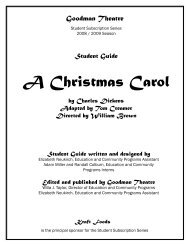Download - Goodman Theatre
Download - Goodman Theatre
Download - Goodman Theatre
You also want an ePaper? Increase the reach of your titles
YUMPU automatically turns print PDFs into web optimized ePapers that Google loves.
Rather than simply laying on a concept,<br />
Bieito’s goal is to create a visual and<br />
auditory universe that releases the text<br />
from the confines of history—thus<br />
unlocking its meaning and connecting<br />
it more directly to the present moment.<br />
more directly to the present moment. In a<br />
recent conversation with the <strong>Goodman</strong>’s<br />
Associate Dramaturg, Neena Arndt, Bieito<br />
explained his process this way:<br />
I have a way of approaching the text,<br />
I have to prepare…reading a lot about<br />
the context, the period, about the<br />
writer. In this case, with Tennessee<br />
Williams, there are his Memoirs. After<br />
that, you think—what was the writer<br />
trying to do? And what does it mean<br />
for the audience, today, or what does<br />
it mean to me today? And what can<br />
I express of myself with this?<br />
Bieito first came to prominence internationally<br />
in 1997, when his production<br />
of Tómas Bretón’s 1894 zarzuela<br />
(or popular operetta) La verbena de la<br />
paloma (The Festival of the Dove) was<br />
performed at the Edinburgh International<br />
Festival. Setting the piece in an urban<br />
wasteland, Bieito’s production undermined<br />
the “celebratory tone” in which<br />
the piece was generally read, presenting<br />
it instead through the “prism of an overt<br />
social criticism of bourgeois complacency<br />
and corruption.” The production marked<br />
Bieito as an important and original<br />
young voice, but by that time he was<br />
already well known in his native Spain,<br />
where he’d built a reputation tackling a<br />
wide variety of texts—everything from<br />
Shakespeare to Sondheim.<br />
Born in 1963 in a small Spanish town<br />
called Miranda de Ebro, Bieito moved<br />
to Barcelona at the age of 14. He came<br />
of age in the final days of the Franco<br />
regime and was educated by Jesuits.<br />
Bieito grew up in a musical household—<br />
his mother was an amateur singer and<br />
his brother teaches in the Barcelona<br />
Conservatoire—and went on to study art<br />
history at the University of Barcelona. As<br />
a young man he traveled around Europe,<br />
studying and working alongside some of<br />
the continent’s most visionary directors,<br />
including Jerzy Grotowski, Peter Brook,<br />
Giorgio Strehler and Ingmar Bergman.<br />
He made his professional debut in the<br />
mid-1980s at Barcelona’s Adrià Gual<br />
theater with a production of Marivaux’s<br />
The Game of Love and Chance. His<br />
directorial approach—marked by rigorous<br />
textual readings of complex dramatic<br />
works that evolved on sparse stage environments<br />
where décor is reduced to its<br />
bare essentials—was in many ways at<br />
odds with the Spanish, and in particular<br />
Catalan, theater scene at the time, which<br />
was defined in large part by the acrobatic<br />
ingenuity of non-text based performance<br />
companies like Els Joglars, Comediants<br />
and La Fura dels Baus.<br />
From the beginning of his career, Bieito<br />
has sought to balance his identity as a<br />
Catalan director with his interest in working<br />
across linguistic and cultural boundaries.<br />
“Bieito is one of the few Catalanbased<br />
directors who has consciously<br />
sought to work both in Catalan and<br />
Castilian,” explains Maria Delgado in her<br />
article “Calixto Bieito: A Catalan Director<br />
on the International Stage.” “He has<br />
OPPOSITE: Director<br />
Calixto Bieito at Teatre<br />
Romea. Photo by David<br />
Ruano. RIGHT (left to<br />
right): Don Carlos, by<br />
Friedich Schiller. 2009.<br />
Production: Teatre<br />
Romea & Nationaltheater<br />
Mannheim. Tirant lo<br />
Blanc, 2007. Production:<br />
Teatre Romea, Institut<br />
Ramon Llull, Hebbel am<br />
Ufer, Schauspielfrankfurt<br />
& Ajuntament de<br />
Viladecans.<br />
9


